2023届高三英语二轮复习定语从句课件(共22张PPT)
文档属性
| 名称 | 2023届高三英语二轮复习定语从句课件(共22张PPT) | 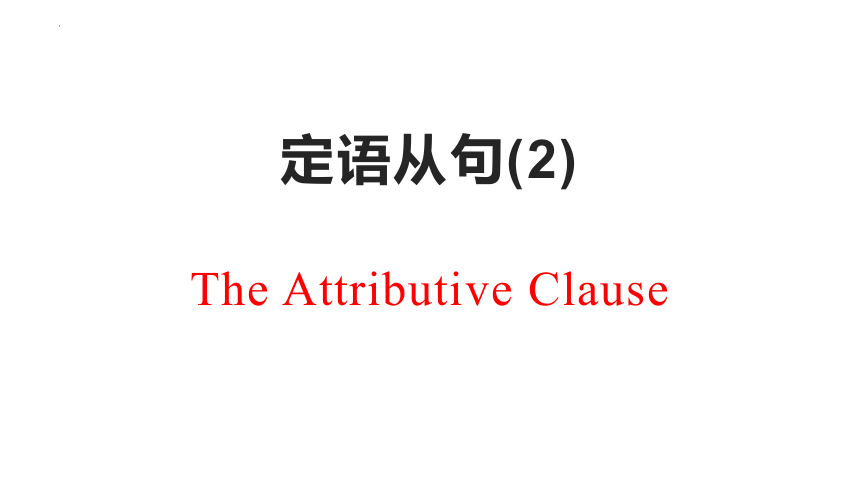 | |
| 格式 | pptx | ||
| 文件大小 | 113.1KB | ||
| 资源类型 | 教案 | ||
| 版本资源 | 通用版 | ||
| 科目 | 英语 | ||
| 更新时间 | 2023-01-20 17:37:31 | ||
图片预览

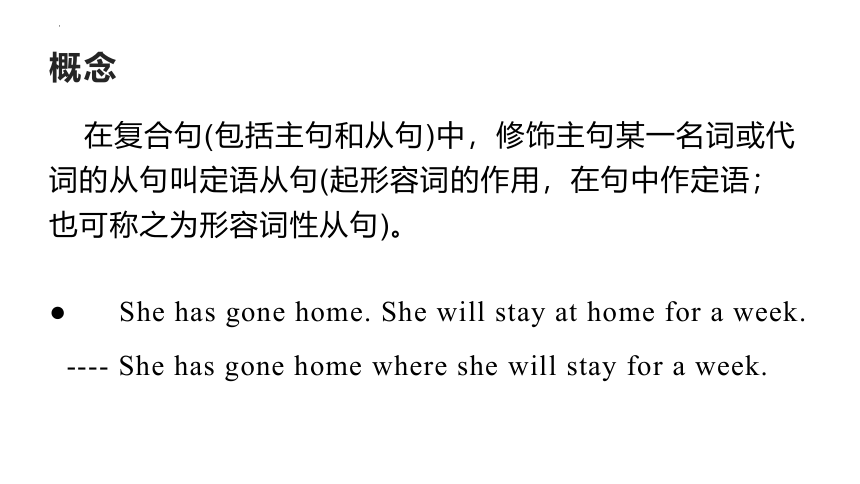
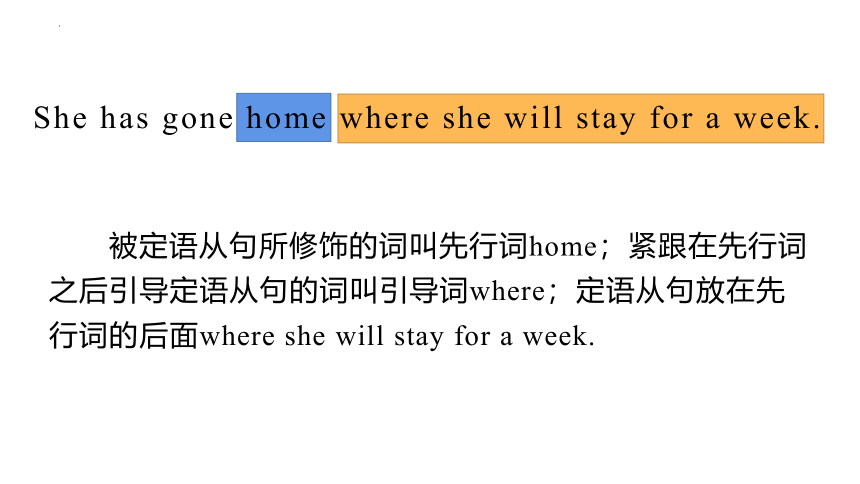
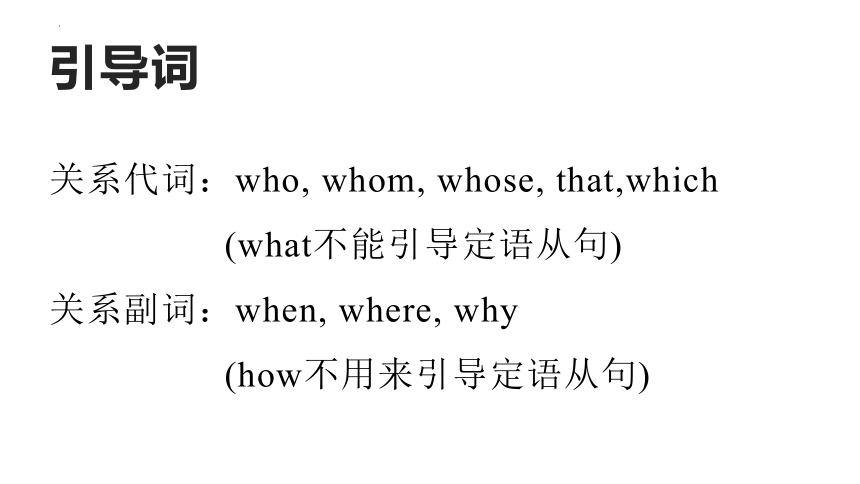
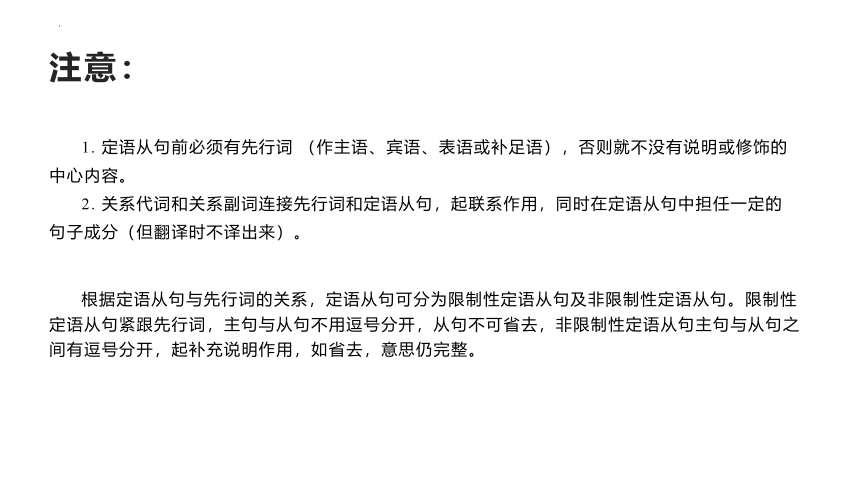
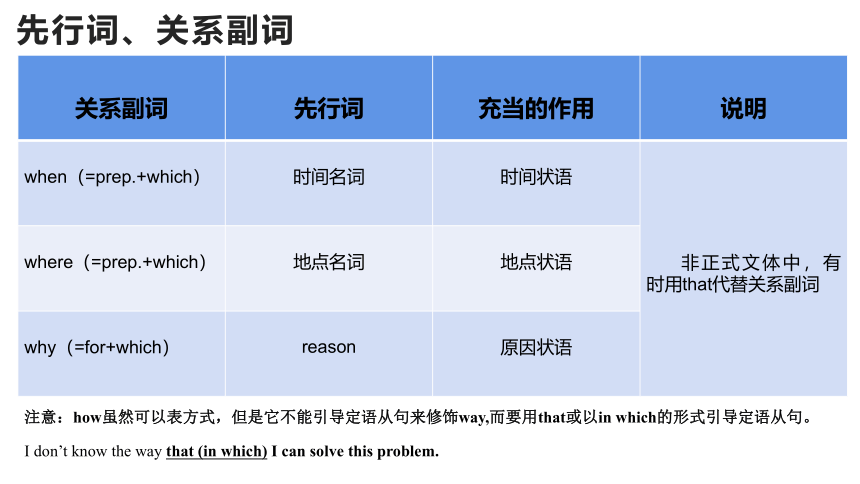
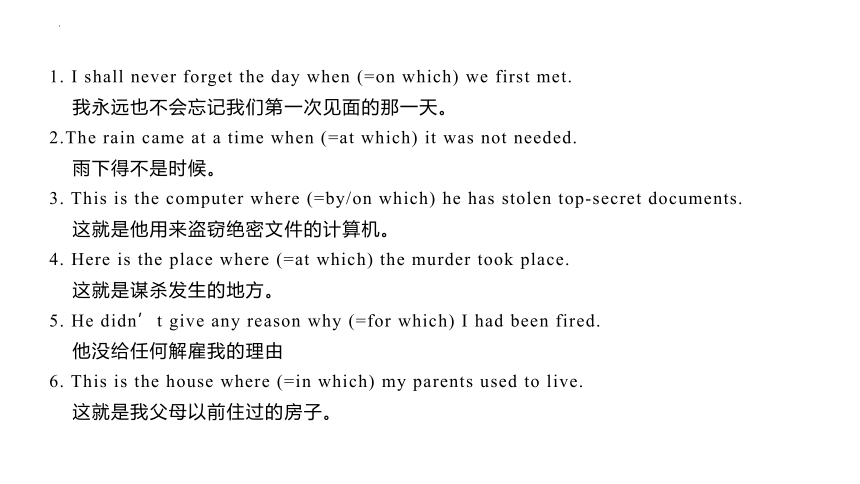
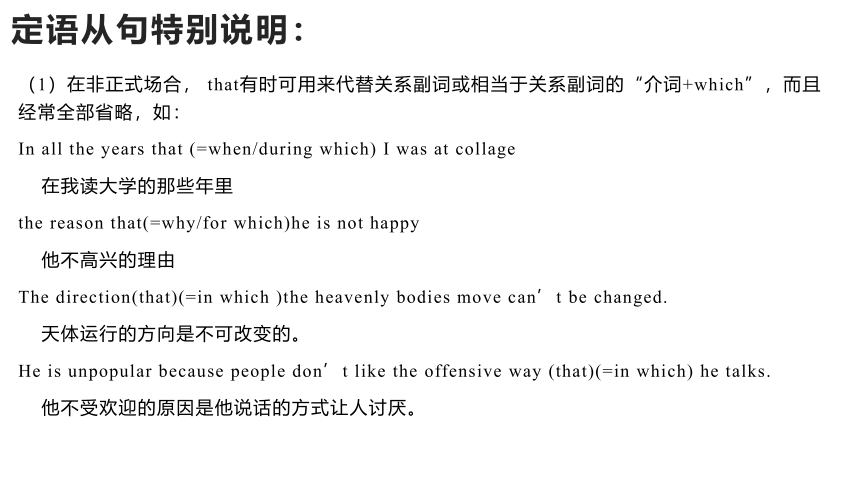
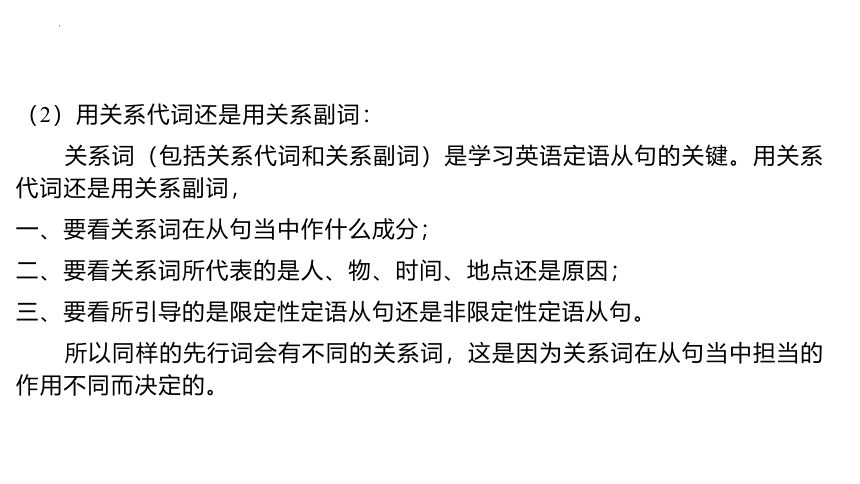
文档简介
(共22张PPT)
定语从句(2)
The Attributive Clause
概念
在复合句(包括主句和从句)中,修饰主句某一名词或代词的从句叫定语从句(起形容词的作用,在句中作定语;也可称之为形容词性从句)。
She has gone home. She will stay at home for a week.
---- She has gone home where she will stay for a week.
She has gone home where she will stay for a week.
被定语从句所修饰的词叫先行词home;紧跟在先行词之后引导定语从句的词叫引导词where;定语从句放在先行词的后面where she will stay for a week.
引导词
关系代词:who, whom, whose, that,which
(what不能引导定语从句)
关系副词:when, where, why
(how不用来引导定语从句)
注意:
1. 定语从句前必须有先行词 (作主语、宾语、表语或补足语),否则就不没有说明或修饰的
中心内容。
2. 关系代词和关系副词连接先行词和定语从句,起联系作用,同时在定语从句中担任一定的
句子成分(但翻译时不译出来)。
根据定语从句与先行词的关系,定语从句可分为限制性定语从句及非限制性定语从句。限制性定语从句紧跟先行词,主句与从句不用逗号分开,从句不可省去,非限制性定语从句主句与从句之间有逗号分开,起补充说明作用,如省去,意思仍完整。
先行词、关系副词
关系副词 先行词 充当的作用
说明
when(=prep.+which) 时间名词 时间状语
非正式文体中,有时用that代替关系副词
where(=prep.+which) 地点名词 地点状语
why(=for+which) reason 原因状语
注意:how虽然可以表方式,但是它不能引导定语从句来修饰way,而要用that或以in which的形式引导定语从句。
I don’t know the way that (in which) I can solve this problem.
1. I shall never forget the day when (=on which) we first met.
我永远也不会忘记我们第一次见面的那一天。
2.The rain came at a time when (=at which) it was not needed.
雨下得不是时候。
3. This is the computer where (=by/on which) he has stolen top-secret documents.
这就是他用来盗窃绝密文件的计算机。
4. Here is the place where (=at which) the murder took place.
这就是谋杀发生的地方。
5. He didn’t give any reason why (=for which) I had been fired.
他没给任何解雇我的理由
6. This is the house where (=in which) my parents used to live.
这就是我父母以前住过的房子。
定语从句特别说明:
(1)在非正式场合, that有时可用来代替关系副词或相当于关系副词的“介词+which”,而且经常全部省略,如:
In all the years that (=when/during which) I was at collage
在我读大学的那些年里
the reason that(=why/for which)he is not happy
他不高兴的理由
The direction(that)(=in which )the heavenly bodies move can’t be changed.
天体运行的方向是不可改变的。
He is unpopular because people don’t like the offensive way (that)(=in which) he talks.
他不受欢迎的原因是他说话的方式让人讨厌。
(2)用关系代词还是用关系副词:
关系词(包括关系代词和关系副词)是学习英语定语从句的关键。用关系代词还是用关系副词,
一、要看关系词在从句当中作什么成分;
二、要看关系词所代表的是人、物、时间、地点还是原因;
三、要看所引导的是限定性定语从句还是非限定性定语从句。
所以同样的先行词会有不同的关系词,这是因为关系词在从句当中担当的作用不同而决定的。
This is the room where/in which we’ll celebrate the New Year.
这是我们将要在里面庆贺新年的房间。(充当地点状语)
This is the room(that /which)we’ll celebrate the New Year in.
这是我们将要在里面庆贺新年的房间。(充当介词宾语,可省略。)
This is the room which /that will be used for the celebration of the New Year.
这是那个将要被用来庆贺新年的房间。(充当主语)
This is the room (which/that) we’ll use for the New Year dinner party.
这是我们将要用来举行新年晚宴的房间。(充当宾语,可省略。)
The reason (that /which) he had given was not sound enough.
他给的理由不够充分。(充当宾语,可省略)
The reason why/for which he had done that was not sound enough.
他做那件事的理由不够充分。(充当原因状语)
This is the house where she lives.这是她住的房子。
(3)定语从句中的时态。如果主句是一般将来时或过去将来时,从句的动作与主句的同时发生,那么该从句要用一般现在时表示一般将来时、用一般过去时表示过去将来时。
Anyone who/that touches the wire will get an electric shock.
任何碰这根电线的人将受到电击。(不用will touch)
I would give her anything that she asked for.
她要什么我就给她什么。(不用would ask)
The first person who/that opens the door will get a shock.
第一个开门的人将被吓一跳。(不用will open)
There will be a special price for anybody who orders a suit in the next two weeks.
任何人在下两周内定做套装都将享受优惠价格。(不用will order)
但是,如果从句和主句的动作在将来不同的时间发生,则两部分都要用来将来时,如:
Those who will go abroad for training next year will start learning English tomorrow.
那些明年出国受训的人员,将从明天开始学习外语。
要点总结:
①先行词有最高级形容词修饰时,常用that,而不用which:
Edison was one of the greatest inventors that ever lived.
爱迪生是曾经有过的最伟大的发明家之一。
This is the best film that I’ve ever seen.
这是我曾经看过的最好的电影。
She was the greatest woman that/who has ever lived.
她是曾经有过的最伟大的女人。
②先行词有the same, the very, the first, the last, all, no, the only, much, little, none, any, every等时,常用that, 而不用which:
He was the first man that we saw in the village.
他是我们在那个村子里看到的第一个人。
There is little that is interesting.
没什么令人感兴趣。
I still remember the first time that we met.
我仍然记得我们第一次见面的时候。
I’ll do anything (that) I can to help you.
我将尽一切可能帮助你。
Everything that can be done has been done.
能做的一切都做了。
③当先行词既有人又有物时,用that,不用which,
如:We were deeply impressed by the workers and their working conditions that we had visited.
我们参观过的工人及他们的工作条件留下了深刻印象。
We listened to him talk about the men and books that interested him。
我们听他谈论他感兴趣的人物和书籍。
④在same和such之后,定语从句用as引导,
如:Let’s discuss only such questions as concern us.
让我们只讨论与我们有关的问题。
I’ve never heard such stories as he tells.
我从来没听说过他讲的这种故事。
I shall be surprised if he does this in the same way as I do.
如果他做这件事的方法和我一样,那就奇怪了。
She works in the same office as I do.
她和我在同一个办公室工作。
She wears the same kind of clothes as her sister does.
她姐妹俩穿同样的衣服。
在same和such之后,定语从句用as引导,偶尔,the same 后面也用that。
He’s wearing the same suit that he wore at Mary’s wedding.
他穿着与他在Mary的婚礼上穿的一样的衣服。
She works in the same office that I do.
她和我在同一个办公室工作。
This is the same watch that I have lost.
这块表和我丢的那块一样。
as引导的非限制性定语从句
as 引导非限定性定语从句即可放在主句之前,也可放在主句之后,用来修饰整个句子。当as在从句中作主语时,后面常接下列句型。
如:as is known, as is said, as is reported as is announced 等。
As we all know, Mr. Wang is a good teacher.
As is known to all, the earth revolves round the sun.
He is tired, as you can see.
As I expected, he didn’t believe me.
As 引导非限定性定语从句时与which的区别:当主句和从句语义一致时,用as;反之,用which。
He made a long speech, as was expected.
He made a long speech, which was unexpected.
Tom drinks a lot every day, which his wife doesn’t like at all.
⑤在“介词+关系代词”的结构中,也可用复杂介词,如:by means of (用,依靠),as a result of (作为结果)等:
I have three children, one daughter and two sons, all of whom graduated from the same university .
我有三个孩子:一个女儿、两个儿子,他们都毕业于同一所大学。
The police, in whom I have great confidence, are trying to find out who did it.
我对警察有极大的信心,他们正在努力寻找是谁做的这件事。
This is the part of the river in which I like to swim. (in which=where)
我喜欢在这条河里面游泳,这就是(我喜欢游的)那个地方。
The man from whom you bought the house is my uncle.
你从他那里买下房子的那个人是我叔叔。
This is the desk by means of which he jumped over the wall.
这就是他用来跳过墙去的那张桌子。
She was running a fever, as a result of which she failed in the exam.
她当时正发烧,所以考试失败了。
He is the man from whose house the picture was stolen.
他就是那个家里的画被偷了的人。
⑥一个先行词后面可以跟一个以上的定语从句,这种现象叫双重关系从句:
Here are some words which are often used but which are very confusing.
这里有些常用但非常混乱的词。
He is the only person that I can find who is able to solve the problem.
他是我能找到的唯一解决这个问题的人。
Thank you
定语从句(2)
The Attributive Clause
概念
在复合句(包括主句和从句)中,修饰主句某一名词或代词的从句叫定语从句(起形容词的作用,在句中作定语;也可称之为形容词性从句)。
She has gone home. She will stay at home for a week.
---- She has gone home where she will stay for a week.
She has gone home where she will stay for a week.
被定语从句所修饰的词叫先行词home;紧跟在先行词之后引导定语从句的词叫引导词where;定语从句放在先行词的后面where she will stay for a week.
引导词
关系代词:who, whom, whose, that,which
(what不能引导定语从句)
关系副词:when, where, why
(how不用来引导定语从句)
注意:
1. 定语从句前必须有先行词 (作主语、宾语、表语或补足语),否则就不没有说明或修饰的
中心内容。
2. 关系代词和关系副词连接先行词和定语从句,起联系作用,同时在定语从句中担任一定的
句子成分(但翻译时不译出来)。
根据定语从句与先行词的关系,定语从句可分为限制性定语从句及非限制性定语从句。限制性定语从句紧跟先行词,主句与从句不用逗号分开,从句不可省去,非限制性定语从句主句与从句之间有逗号分开,起补充说明作用,如省去,意思仍完整。
先行词、关系副词
关系副词 先行词 充当的作用
说明
when(=prep.+which) 时间名词 时间状语
非正式文体中,有时用that代替关系副词
where(=prep.+which) 地点名词 地点状语
why(=for+which) reason 原因状语
注意:how虽然可以表方式,但是它不能引导定语从句来修饰way,而要用that或以in which的形式引导定语从句。
I don’t know the way that (in which) I can solve this problem.
1. I shall never forget the day when (=on which) we first met.
我永远也不会忘记我们第一次见面的那一天。
2.The rain came at a time when (=at which) it was not needed.
雨下得不是时候。
3. This is the computer where (=by/on which) he has stolen top-secret documents.
这就是他用来盗窃绝密文件的计算机。
4. Here is the place where (=at which) the murder took place.
这就是谋杀发生的地方。
5. He didn’t give any reason why (=for which) I had been fired.
他没给任何解雇我的理由
6. This is the house where (=in which) my parents used to live.
这就是我父母以前住过的房子。
定语从句特别说明:
(1)在非正式场合, that有时可用来代替关系副词或相当于关系副词的“介词+which”,而且经常全部省略,如:
In all the years that (=when/during which) I was at collage
在我读大学的那些年里
the reason that(=why/for which)he is not happy
他不高兴的理由
The direction(that)(=in which )the heavenly bodies move can’t be changed.
天体运行的方向是不可改变的。
He is unpopular because people don’t like the offensive way (that)(=in which) he talks.
他不受欢迎的原因是他说话的方式让人讨厌。
(2)用关系代词还是用关系副词:
关系词(包括关系代词和关系副词)是学习英语定语从句的关键。用关系代词还是用关系副词,
一、要看关系词在从句当中作什么成分;
二、要看关系词所代表的是人、物、时间、地点还是原因;
三、要看所引导的是限定性定语从句还是非限定性定语从句。
所以同样的先行词会有不同的关系词,这是因为关系词在从句当中担当的作用不同而决定的。
This is the room where/in which we’ll celebrate the New Year.
这是我们将要在里面庆贺新年的房间。(充当地点状语)
This is the room(that /which)we’ll celebrate the New Year in.
这是我们将要在里面庆贺新年的房间。(充当介词宾语,可省略。)
This is the room which /that will be used for the celebration of the New Year.
这是那个将要被用来庆贺新年的房间。(充当主语)
This is the room (which/that) we’ll use for the New Year dinner party.
这是我们将要用来举行新年晚宴的房间。(充当宾语,可省略。)
The reason (that /which) he had given was not sound enough.
他给的理由不够充分。(充当宾语,可省略)
The reason why/for which he had done that was not sound enough.
他做那件事的理由不够充分。(充当原因状语)
This is the house where she lives.这是她住的房子。
(3)定语从句中的时态。如果主句是一般将来时或过去将来时,从句的动作与主句的同时发生,那么该从句要用一般现在时表示一般将来时、用一般过去时表示过去将来时。
Anyone who/that touches the wire will get an electric shock.
任何碰这根电线的人将受到电击。(不用will touch)
I would give her anything that she asked for.
她要什么我就给她什么。(不用would ask)
The first person who/that opens the door will get a shock.
第一个开门的人将被吓一跳。(不用will open)
There will be a special price for anybody who orders a suit in the next two weeks.
任何人在下两周内定做套装都将享受优惠价格。(不用will order)
但是,如果从句和主句的动作在将来不同的时间发生,则两部分都要用来将来时,如:
Those who will go abroad for training next year will start learning English tomorrow.
那些明年出国受训的人员,将从明天开始学习外语。
要点总结:
①先行词有最高级形容词修饰时,常用that,而不用which:
Edison was one of the greatest inventors that ever lived.
爱迪生是曾经有过的最伟大的发明家之一。
This is the best film that I’ve ever seen.
这是我曾经看过的最好的电影。
She was the greatest woman that/who has ever lived.
她是曾经有过的最伟大的女人。
②先行词有the same, the very, the first, the last, all, no, the only, much, little, none, any, every等时,常用that, 而不用which:
He was the first man that we saw in the village.
他是我们在那个村子里看到的第一个人。
There is little that is interesting.
没什么令人感兴趣。
I still remember the first time that we met.
我仍然记得我们第一次见面的时候。
I’ll do anything (that) I can to help you.
我将尽一切可能帮助你。
Everything that can be done has been done.
能做的一切都做了。
③当先行词既有人又有物时,用that,不用which,
如:We were deeply impressed by the workers and their working conditions that we had visited.
我们参观过的工人及他们的工作条件留下了深刻印象。
We listened to him talk about the men and books that interested him。
我们听他谈论他感兴趣的人物和书籍。
④在same和such之后,定语从句用as引导,
如:Let’s discuss only such questions as concern us.
让我们只讨论与我们有关的问题。
I’ve never heard such stories as he tells.
我从来没听说过他讲的这种故事。
I shall be surprised if he does this in the same way as I do.
如果他做这件事的方法和我一样,那就奇怪了。
She works in the same office as I do.
她和我在同一个办公室工作。
She wears the same kind of clothes as her sister does.
她姐妹俩穿同样的衣服。
在same和such之后,定语从句用as引导,偶尔,the same 后面也用that。
He’s wearing the same suit that he wore at Mary’s wedding.
他穿着与他在Mary的婚礼上穿的一样的衣服。
She works in the same office that I do.
她和我在同一个办公室工作。
This is the same watch that I have lost.
这块表和我丢的那块一样。
as引导的非限制性定语从句
as 引导非限定性定语从句即可放在主句之前,也可放在主句之后,用来修饰整个句子。当as在从句中作主语时,后面常接下列句型。
如:as is known, as is said, as is reported as is announced 等。
As we all know, Mr. Wang is a good teacher.
As is known to all, the earth revolves round the sun.
He is tired, as you can see.
As I expected, he didn’t believe me.
As 引导非限定性定语从句时与which的区别:当主句和从句语义一致时,用as;反之,用which。
He made a long speech, as was expected.
He made a long speech, which was unexpected.
Tom drinks a lot every day, which his wife doesn’t like at all.
⑤在“介词+关系代词”的结构中,也可用复杂介词,如:by means of (用,依靠),as a result of (作为结果)等:
I have three children, one daughter and two sons, all of whom graduated from the same university .
我有三个孩子:一个女儿、两个儿子,他们都毕业于同一所大学。
The police, in whom I have great confidence, are trying to find out who did it.
我对警察有极大的信心,他们正在努力寻找是谁做的这件事。
This is the part of the river in which I like to swim. (in which=where)
我喜欢在这条河里面游泳,这就是(我喜欢游的)那个地方。
The man from whom you bought the house is my uncle.
你从他那里买下房子的那个人是我叔叔。
This is the desk by means of which he jumped over the wall.
这就是他用来跳过墙去的那张桌子。
She was running a fever, as a result of which she failed in the exam.
她当时正发烧,所以考试失败了。
He is the man from whose house the picture was stolen.
他就是那个家里的画被偷了的人。
⑥一个先行词后面可以跟一个以上的定语从句,这种现象叫双重关系从句:
Here are some words which are often used but which are very confusing.
这里有些常用但非常混乱的词。
He is the only person that I can find who is able to solve the problem.
他是我能找到的唯一解决这个问题的人。
Thank you
